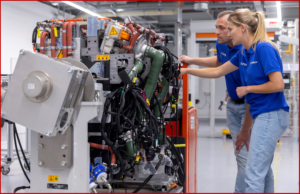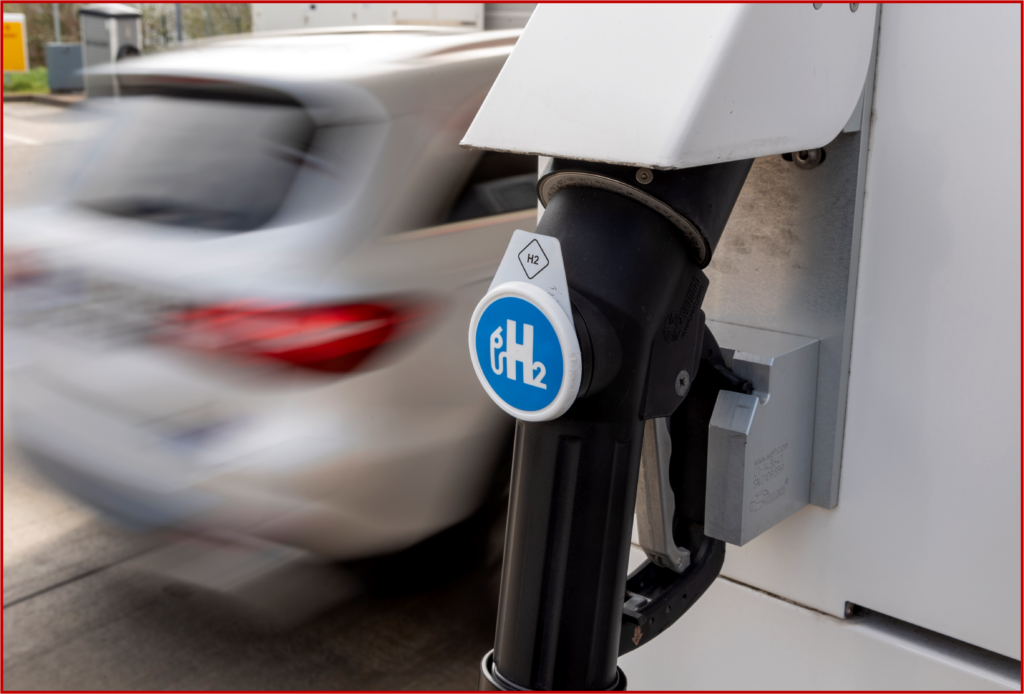
Click for more hydrogen.
Mega-supplier Bosch said today that it is entering the hydrogen age of mobility. At its oldest plant, Stuttgart-Feuerbach, Bosch has now begun mass production of its fuel-cell power module. Nikola Corporation, based in the US with a troubled legal history, will serve as the pilot customer with its Class 8 hydrogen fuel-cell electric truck, which is scheduled to enter the North American market in Q3 of 2023. (AutoInformed on: GM Signs MoU with Nikola to Supply Hydrotec Fuel Cells; SEC Charges Nikola Founder Trevor Milton With Fraud; Nikola to Pay $125 Million to SEC on Fraud Charges)
“Bosch knows its way around hydrogen, and Bosch is growing with hydrogen, “said Bosch chair Stefan Hartung. Bosch is spending ~€2.5 billion in H2 technology from 2021 to 2026. Bosch is active in the whole hydrogen value chain, developing technology for its production and application. By 2030, Bosch claims it will generate sales of roughly ~€5 billion with hydrogen technology.

Click on H2 pump for more.
Bosch is using it global manufacturing network – some located in totalitarian countries actively hostile to western Democracies – as well as German locations. The Bosch plant in Bamberg, Germany, will supply the Feuerbach factory with the fuel-cell stack. Other system components such as the electric air compressor and the recirculation blower come from the Bosch plant in Homburg, Germany.
“Bosch is the first company to produce these systems in both China and Germany,” said Markus Heyn, member of the Bosch board of management and chair of Bosch Mobility.
Bosch is also planning to manufacture stacks for mobile applications in its US plant in Anderson, South Carolina. Worldwide, the company expects that, by 2030, one in five new trucks weighing six tons or more will feature a fuel-cell powertrain.
At the beginning of this year, Bosch started making prototypes for electrolysis using proton exchange membranes, the reverse of the energy conversion method used in mobile fuel cells. Starting in the fall, the company intends to make 1.25-megawatt prototypes available for pilot applications. It claims it is on track to start volume production in 2025.
Bosch, along with many major automakers and suppliers, is exploring several options for the use of hydrogen. Stationary solid-oxide fuel cells can be used for the distributed supply of power and heat. In a pilot project at the hospital in Erkelenz, near Cologne in Germany, Bosch wants to use this technology to achieve overall efficiency of 90%. The micropower plant there will initially run on natural gas, but can be converted to green hydrogen.
Apart from the fuel-cell powertrain, Bosch is also working on the hydrogen engine, developing systems for both port and direct injection of hydrogen. This technical solution is particularly suitable for heavy vehicles on long hauls with heavy loads.
“A hydrogen engine can do everything a diesel engine does, but on top of that, it is carbon neutral. It also allows a fast and cost-effective entry into hydrogen-based mobility,” Heyn said. One major claimed advantage is that more than 90% of the development and manufacturing technologies needed for it already exist. The H2 engine is expected to be launched starting in 2024. Bosch said it had four orders for production projects from all the major economic regions, and expects six-figure unit volumes by 2030.
AutoInformed on

About Ken Zino
Ken Zino, editor and publisher of AutoInformed, is a versatile auto industry participant with global experience spanning decades in print and broadcast journalism, as well as social media. He has automobile testing, marketing, public relations and communications experience. He is past president of The International Motor Press Assn, the Detroit Press Club, founding member and first President of the Automotive Press Assn. He is a member of APA, IMPA and the Midwest Automotive Press Assn.
He also brings an historical perspective while citing their contemporary relevance of the work of legendary auto writers such as Ken Purdy, Jim Dunne or Jerry Flint, or writers such as Red Smith, Mark Twain, Thomas Jefferson – all to bring perspective to a chaotic automotive universe.
Above all, decades after he first drove a car, Zino still revels in the sound of the exhaust as the throttle is blipped during a downshift and the driver’s rush that occurs when the entry, apex and exit points of a turn are smoothly and swiftly crossed. It’s the beginning of a perfect lap.
AutoInformed has an editorial philosophy that loves transportation machines of all kinds while promoting critical thinking about the future use of cars and trucks.
Zino builds AutoInformed from his background in automotive journalism starting at Hearst Publishing in New York City on Motor and MotorTech Magazines and car testing where he reviewed hundreds of vehicles in his decade-long stint as the Detroit Bureau Chief of Road & Track magazine. Zino has also worked in Europe, and Asia – now the largest automotive market in the world with China at its center.


Bosch Starts Mass Production of a Fuel-Cell Power Module
Click for more hydrogen.
Mega-supplier Bosch said today that it is entering the hydrogen age of mobility. At its oldest plant, Stuttgart-Feuerbach, Bosch has now begun mass production of its fuel-cell power module. Nikola Corporation, based in the US with a troubled legal history, will serve as the pilot customer with its Class 8 hydrogen fuel-cell electric truck, which is scheduled to enter the North American market in Q3 of 2023. (AutoInformed on: GM Signs MoU with Nikola to Supply Hydrotec Fuel Cells; SEC Charges Nikola Founder Trevor Milton With Fraud; Nikola to Pay $125 Million to SEC on Fraud Charges)
“Bosch knows its way around hydrogen, and Bosch is growing with hydrogen, “said Bosch chair Stefan Hartung. Bosch is spending ~€2.5 billion in H2 technology from 2021 to 2026. Bosch is active in the whole hydrogen value chain, developing technology for its production and application. By 2030, Bosch claims it will generate sales of roughly ~€5 billion with hydrogen technology.
Click on H2 pump for more.
Bosch is using it global manufacturing network – some located in totalitarian countries actively hostile to western Democracies – as well as German locations. The Bosch plant in Bamberg, Germany, will supply the Feuerbach factory with the fuel-cell stack. Other system components such as the electric air compressor and the recirculation blower come from the Bosch plant in Homburg, Germany.
“Bosch is the first company to produce these systems in both China and Germany,” said Markus Heyn, member of the Bosch board of management and chair of Bosch Mobility.
Bosch is also planning to manufacture stacks for mobile applications in its US plant in Anderson, South Carolina. Worldwide, the company expects that, by 2030, one in five new trucks weighing six tons or more will feature a fuel-cell powertrain.
At the beginning of this year, Bosch started making prototypes for electrolysis using proton exchange membranes, the reverse of the energy conversion method used in mobile fuel cells. Starting in the fall, the company intends to make 1.25-megawatt prototypes available for pilot applications. It claims it is on track to start volume production in 2025.
Bosch, along with many major automakers and suppliers, is exploring several options for the use of hydrogen. Stationary solid-oxide fuel cells can be used for the distributed supply of power and heat. In a pilot project at the hospital in Erkelenz, near Cologne in Germany, Bosch wants to use this technology to achieve overall efficiency of 90%. The micropower plant there will initially run on natural gas, but can be converted to green hydrogen.
Apart from the fuel-cell powertrain, Bosch is also working on the hydrogen engine, developing systems for both port and direct injection of hydrogen. This technical solution is particularly suitable for heavy vehicles on long hauls with heavy loads.
“A hydrogen engine can do everything a diesel engine does, but on top of that, it is carbon neutral. It also allows a fast and cost-effective entry into hydrogen-based mobility,” Heyn said. One major claimed advantage is that more than 90% of the development and manufacturing technologies needed for it already exist. The H2 engine is expected to be launched starting in 2024. Bosch said it had four orders for production projects from all the major economic regions, and expects six-figure unit volumes by 2030.
AutoInformed on
About Ken Zino
Ken Zino, editor and publisher of AutoInformed, is a versatile auto industry participant with global experience spanning decades in print and broadcast journalism, as well as social media. He has automobile testing, marketing, public relations and communications experience. He is past president of The International Motor Press Assn, the Detroit Press Club, founding member and first President of the Automotive Press Assn. He is a member of APA, IMPA and the Midwest Automotive Press Assn. He also brings an historical perspective while citing their contemporary relevance of the work of legendary auto writers such as Ken Purdy, Jim Dunne or Jerry Flint, or writers such as Red Smith, Mark Twain, Thomas Jefferson – all to bring perspective to a chaotic automotive universe. Above all, decades after he first drove a car, Zino still revels in the sound of the exhaust as the throttle is blipped during a downshift and the driver’s rush that occurs when the entry, apex and exit points of a turn are smoothly and swiftly crossed. It’s the beginning of a perfect lap. AutoInformed has an editorial philosophy that loves transportation machines of all kinds while promoting critical thinking about the future use of cars and trucks. Zino builds AutoInformed from his background in automotive journalism starting at Hearst Publishing in New York City on Motor and MotorTech Magazines and car testing where he reviewed hundreds of vehicles in his decade-long stint as the Detroit Bureau Chief of Road & Track magazine. Zino has also worked in Europe, and Asia – now the largest automotive market in the world with China at its center.